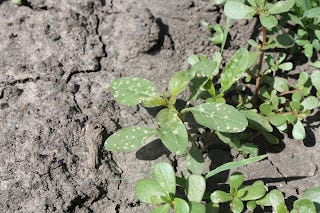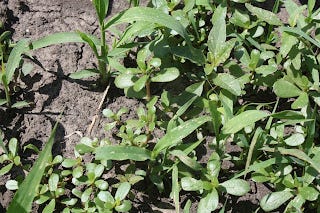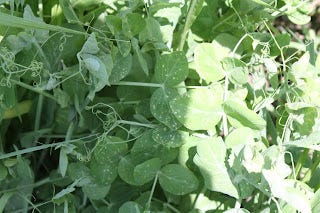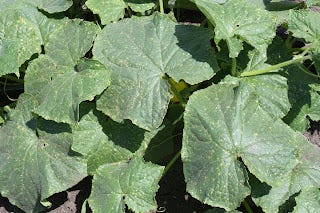Off Target
I am not prone to making strong statements without doing something to balance it out. I realize those who read what I write do not have to agree with me. I am fully aware that there are other opinions and feelings that are valid and worthy of consideration. I get that.
But, I have no tolerance for people who use dangerous tools in ways that may hurt others.
Once again, our farm has been subjected to chemical drift from a neighboring farm. Once again, we are stunned by the lack of consideration and we are (once again) preparing to be made out to be unreasonable, alarmist neighbors who attack everyone else who doesn't "see things the way we do."
The truth of the matter is we likely have dealt with some sort of drift damage every single season we have worked our farm. We just aren't always in a position to verify the situation. If we can't verify, we try not to accuse and we try not put anyone on the carpet for what is likely a chemical misapplication situation. And, we really do not enjoy the process of trying to track down the source, assessing damage and going through all of the turmoil that follows. It's so much easier to just gripe about it and watch while the crop does poorly or fails or we decide it isn't safe to give to others to eat. Seriously. That IS the easier approach.

note the spotting on the cucumbers - that were just starting to set fruit
This time Tammy caught the applicator entering the field and stopped him. The wind was coming our direction at an average of 15mph, which is normally a higher amount than herbicide labels allow for (in fact, Buccaneer is rated at 10 mph and Battlestar at 15mph). To make a long story shorter, the applicator called his 'boss' who told him to spray anyway. Tammy called the 'boss' and was told that they were aware we were an organic farm and they were aware that it was a bit windy. But, 'they were pressed for time because it was going to rain soon and they were going to spray anyway.'

Yes, these are weeds, but note the same spotting
In short, what this person said was: "Our need is greater than yours and we don't really care what other damage we might cause." They did try to say that they had a 'drift retardant' in the mix and they claimed it would NOT drift at all. But, their statement that it was a bit windy and that they had to spray anyway because they really NEEDED to was enough to show use that they didn't quite believe what they were saying and they needed to justify their actions.
Conditions were hot and windy. The heat was only going to increase potential damage to our crops if there was any drift. Once again, most chemicals recommend that temps be below 85 degrees Fahrenheit for application. Guess what the temperature was at that moment? Needless to say, we saw herbicide spotting the very next day on plants that had been just fine the day before.
There are numerous stories out there of representatives for applicators coming to places like ours and proclaiming the damage to be a 'disease' problem or a 'pest' problem rather than a drift issue. But, generally speaking, diseases will impact plants of the same type and pests will have favored plants. Neither is as indiscriminate as an herbicide. If you simply look at the pictures, you'll see that this 'illness' was, in fact, indiscriminate. And, it is NOT coincidence that it appeared the day after application on a windy day of an herbicide cocktail.

Note the spotting on grasses and plantain.
It's Not Just the "Organic Thing"
The applicator company seemed to think it was only about the fact that we were 'organic.' To get the feel for this, you need to say the word 'organic' as if you have something really bad tasting in your mouth. But, our organic certification status is actually the smallest part of our concern.
1. It's about people working outside
There was no checking to see if there was anyone working outside in the potential spray drift zone. There wasn't even a question about it. There were four of us working outside at the time they pulled up. They should inform us (without our asking) what is to be sprayed and they should inform us as to the period of time the application area is 'off-limits' to humans. But, more importantly, they should cease and desist as soon as they find out there might be people working in what could become a spray drift zone.
2. It's about the kinds of crops we grow
Whether we grow them with organic certification or not, our cucumbers, peas, carrots, pole beans, etc etc are NOT Roundup ready. They are actually more, not less, susceptible to the chemicals than the weeds the applicator is supposedly targeting. Is it possible these plants will grow through it? Certainly. It depends on a number of factors. But, you can bet that they were set back. And, in a year where we had an enforced late start due to the weather, we can not afford to have someone's poor choices set us back even more.
3. It's about food safety.

who can tell me if the peas on this vine will be safe to eat? And when?
So, who can tell me what's safe to eat from these plants - and by whom? This assumes, of course, that we will get more harvest from this area. If you grow corn or soybeans, you don't even think about consumer food safety because these crops are NOT grown for human consumption. That means they use many chemicals that are not rated as safe to be a residue on an edible crop.
I'll give you a hint, there isn't sufficient research funded for this kind of knowledge because supposedly, these chemicals are not applied when they could drift.
What is the result now that we have spend time we should/could have been doing productive work on the farm? The short answers? The peas are not safe for human consumption. That crop is lost. The earlier cucumbers could be harvested beginning July 29. That means we have to keep harvesting and destroying the fruit until July 29. Then, we can harvest for consumption. The other crops in the field that have later harvest dates should be safe for consumption once they are ready, but they will not be certified organic.
4. It's about animals on the farm
If we can't be bothered to study drift in real world application and the possible impact on humans, why would we possibly bother with its effect on farm animals? It's not a simple situation where you can 'lock the animals up' while the spraying is going on. There were heat indices around 116 degrees Fahrenheit. Lock the birds up in a hot building? Really?
5. It's about a failure to plan and a failure to care about your neighbor.
This is not the first time we've had the 'we have no choice, we HAVE to spray now' used on us. It's an accusation. It's a plea for us (our farm) take the blame because we exist and we are inconvenient. It's just one way to use guilt in an effort to bully someone else to get your way. It's a way to avoid taking responsibility for watching the weather more carefully and managing resources correctly. It's a way to pretend that your failure to read and adhere to the use labels provided for each and every ag chemical is not your problem.
Everyone does it - is not an excuse.
Our farm is bigger and more important than your farm - is not an excuse.
You don't do things the way we do things - is not an excuse.
You should make BIGGER buffers on your farm - is only a way to try to shift blame - especially when you maintain no buffers.
Telling us we are responsible for responding to your whims and your schedule for spray is rude, absurd and not the way my parents taught me to deal with my neighbors. I am guessing your parents taught you better as well.
Telling us we have to 'find a way to work together' does not mean we are the only ones who should make concessions.
Explain to me why YOUR worry about YOUR crops (or your client's crops) is valid and my worry for my crops, my health, my worker's health, my spouse's health, our animals health, our customer's health is unreasonable and easy to ignore.
Explain to me why we have to spend time tracking down use label information, find ways to get testing done and go through the processes with the Pesticide Bureau and my organic certifying agency because you cannot be bothered to use a tool correctly.
There is no sufficient excuse.
Herbicides, Pesticides and Fungicides are a Tool that is Abused and Misused Too Often
You heard it from me. I recognize that these chemicals ARE tools. They are dangerous tools that deserve respect with careful and appropriate use. Personally, I choose not to use them and wish more people would also make that choice. But, I am willing to accept that these tools could be used responsibly and well - using a long view to keep the tools effective and to avoid long-term environmental effects that we have yet to fully grasp.
Apparently, the day to day use of these chemicals is not worthy of our attention - whether it is an agricultural situation, such as the one I discuss here or if it is the neighbors lawn that must have no dandelions, no clover and no spiders (dreadful nasty things that they are - despite all the good that they do).
Ways We Could Fix This
Once again, I will call for change in hopes that maybe we will have the energy to make it happen.
Any application of chemicals on a field must require that the neighbors be contacted with a complete list of chemicals to be applied. Direct contact information of the applicator, their company and the requesting farm should be made available to all potentially impacted individuals.
Any application MUST follow all label use recommendations.
Any application that has conditions that could potentially drift off-target to any sensitive site such as a school, waterway, residence, livestock operation, apiary, orchard, vinyard and vegetable operation must be halted until conditions are sufficient to avoid drift of any sort.
Fines and punishments for misapplication must be increased to align punitive damages with actual deterrent.
All fields must have a buffer zone.
Testing facilities for drift must be set up so the turn around time is quick enough that an operation with time sensitive crops (such as ours) can get results for food safety purposes before the crop spoils.
the Pesticide Bureau must receive sufficient funding and staff in order to process complaints efficiently.
funding for research to collect real-world data on drift in agricultural states is needed and should be procured. There need to be drift catching devices throughout rural areas to determine actual chemical drift amounts in our air, soil and water.
All ag fields should have a proper buffer zone along all of its edges.
Provide services for farms impacted by drift to guide them through the processes of collecting information and seeking reparation. Provide services that can give guidance as to food safety, worker safety and animal safety.
If you think this is too much and it is an infringement of rights or it is too much oversight and it will get in the way of efficient farm operations in the state of Iowa, then you can do something about it.
Use these tools properly. Treat your neighbors well and with respect.
I challenge everyone to try that out. But, I have no confidence in that approach - despite my wish that we could make it so. That leaves legislation and enforcement. I would be happy to be proven wrong on that point.



